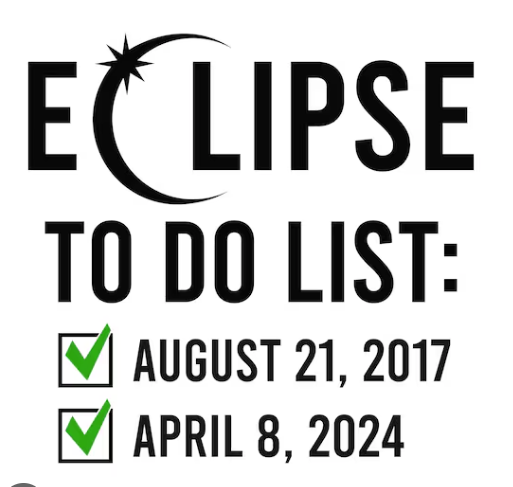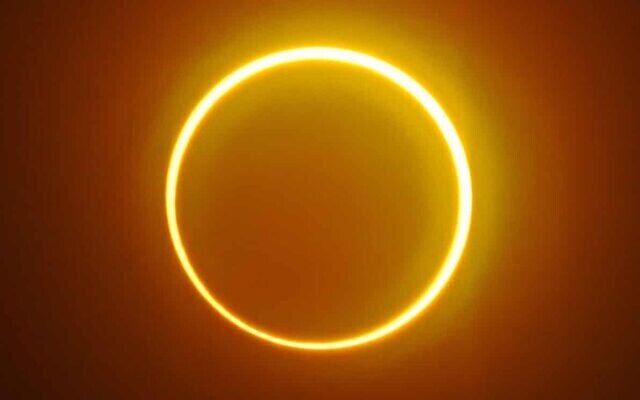The solar eclipse is therefore a visible reminder that the time of molad we announce on the Shabbat preceding Rosh Chodesh represents a theoretical time only, and has no relationship to an astronomical phenomenon. The announced molad is calculated by using the length between one new moon and the next. This figure assumes that every lunar month is of equal length, 29 days, 12 hours 44 minutes and 3 1/3 seconds. The Jewish calendar is based on the axiom that all future times of the molad are based on the theoretical time for the first molad, which was in Tishrei of the first year of Creation. This is assumed to have occurred on a Monday night, at five hours and 204 chalakim—a time that occurred only in theory since, according to Jewish tradition, the sun and the moon had not been created at that time. To determine the time of any molad since then, we simply add 29 days, 5 hours and 204 chalakim for each month from the primordial Tishrei. But this calculated time differs from the actual length of time between one new month and the next, which is not constant. For this reason, the times announced for the molad are not astronomically accurate—and, as we have seen, this can result in a discrepancy of more than 16 hours between the astronomical conjunction and the calculated Jewish conjunction. (To read more about this problem see our post here.]
HalaKhic Aspects of a Solar Eclipse
There are two categories of questions surrounding a solar eclipse. The first focuses on the technical aspects of the eclipse as a natural phenomenon, and the second on the eclipse as an omen of tragedy.
1. Publicizing the date of a forthcoming eclipse
The Mishnah Berurah rules that it is forbidden to tell another person that a rainbow is visible, because this violates the prohibition of slander (מוציא דבה), since the primordial rainbow appeared after the sins of humanity that caused Noah’s Flood.
And since a solar eclipse is, according to today’s page of Talmud, a sign of human sin, it might be suggested that it would also be forbidden to announce the time of a future solar eclipse. However, unlike a rainbow, a solar eclipse may be entirely predicted, and on the basis of this, Rabbi Avigdor Nebenzahl (b. 1935) ruled that it is permitted to publicize the dates and times of a future eclipse. (See R. Avigdor Nebenzahl, Teshuvos Avigdor HaLevi (Sifrei Kedumim: 2012), p. 249 #105.)
2. Reciting a blessing on seeing a solar eclipse
There is halachic precedent for reciting a blessing on seeing an awe-inspiring vista or event. We make a berachah on seeing the Mediterranean Sea, or a rainbow, on hearing thunder and seeing lightening, and even on seeing a person of exceptional beauty. It is perfectly understandable, therefore, for a person witnessing one of the greatest of nature’s spectacles, to wish to mark the event with a blessing. However, there appear to be no halakhic authorities who would allow a berachah to be recited. Perhaps the first to write about this was R. Menachem Mendel Schneerson. In 1957, he was asked if it was permitted to say a berachah on seeing a solar or lunar eclipse, and his reply was unequivocal:
ידוע הכלל אשר אין לחדש ברכה שלא הוזכרה בש"ס (ב"י או"ח סמ"ו). וי"ל הטעם דאין מברכין ע"ז מפני שהוא סימן לפורעניות הבאה )סוכה כט, א(. ואדרבה צריכה תפלה לבטלה וצעקה ולא ברכה
There is a well-established principle that it is forbidden to institute a blessing that is not mentioned in the Talmud. And some say that the reason that no blessing was instituted is because the eclipse is a bad omen. To the contrary, it is important to pray for the omen to be annulled, and to cry out without a berachah. (Iggerot Kodesh 15:1079.)
R. Schneerson combines a halakhic justification for not reciting a berachah with the classic Talmudic teaching from our page today that a solar eclipse occurs as a result of human sin. However, there are two problems with R. Schneerson’s ruling. First, it is normative Jewish practice to recite a berachah on hearing bad news such as the death of a person, and second, the Talmud does not describe a solar eclipse as an omen of forthcoming disaster. It is a sign of sin, not of punishment.
R. Chaim Dovid HaLevi, Av Bet Din (Chief of the Rabbinic Court) of Tel Aviv and Yaffo, also ruled that we are forbidden to create new berachos, (Aseh Lecha Rav [Tel Aviv, 5749], 150) although he understood the urge to do so:
Our Rabbis instituted blessings over acts of creation and powerful natural events, like lightning and thunder and so on. However, they did not do so for a lunar or solar eclipse. And if only today we could institute a blessing when we are aware that an eclipse is indeed an incredible natural event. But we cannot, for a person is forbidden to make up a blessing. If a person still wants to make some form of a blessing, he should recite the verses “And David blessed...blessed are you, God, the Lord of our father Israel, who performs acts of creation.”
Finally, we should note the opinion of R. David Lau, then the Chief Rabbi of Modi’in, and currently the Ashkenazi Chief Rabbi of Israel. A certain David Eisen wrote to R. Lau about his experiences of observing the (partial) solar eclipse of 2001 that could be seen in Israel. He had been left wishing to make a blessing for what was, for him, an awe-inspiring cosmic occurrence. R. Lau empathized with Eisen’s feelings, but noted that since the Rabbis of the Talmud had not prescribed a blessing over an eclipse, it was not possible to institute such a blessing today. Rabbi Lau noted that his own religious response to witnessing the eclipse had been to say Psalm 19, “The Heavens tell of G-d’s glory,” and Psalm 104, “My soul will bless G-d.”
3. Marriage and fasting on the day of a solar eclipse
The Chasidic leader R. Zvi Elimelech Shapira of Dinov (b. 1785), wrote in his classic work Bnei Yissaschar that a man should not marry when the moon is waning, “and particularly not during a lunar eclipse, G- d forbid.”(Bnei Yissaschar, Ma’amarei Rosh Chodesh, #2.) He does not mention whether this would apply to a solar eclipse. The Mishnah Berurah also notes the opinion of the Sefer Chasidim that one should fast on the day of a lunar eclipse, although he does not rule on the matter further (Mishnah Berurah #580:2). The matter was more recently addressed by R. Menachem Lang, who notes that it might be forbidden to marry on the day of any kind of eclipse, but ultimately ruled that there is no such prohibition. When a solar eclipse occurs on the same day as Rosh Chodesh, any fast would be forbidden under the general prohibition of fasting on Rosh Chodesh (Mishnah Berurah #580:1).
[Most of this post comes from an essay published in Hakirah in 2017. You can read the entire essay here.]
A SPECIAL ECLIPSE ANNOUNCEMENT FROM TALMUDOLOGY
Here is the great news: there is another total solar eclipse coming soon to North America!
On Monday April 8, 2024 another total solar eclipse will be visible over North America. If the weather cooperates, it will be seen along a narrow path that starts from Mexico's Pacific coast, passes through several American states, and ends on the Atlantic coast of Canada. The rest of mainland United States and Canada, and parts of the Caribbean, Central America, and Europe will see a partial solar eclipse, which is nowhere nearly as spectacular and is often not even noticeable. The next time you will get to see a total solar eclipse in the US after that will not be until August 2045. So plan now!














